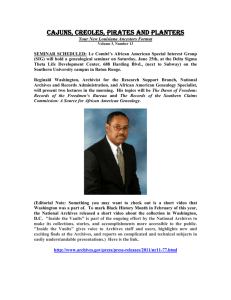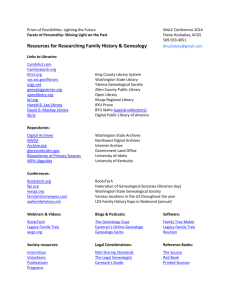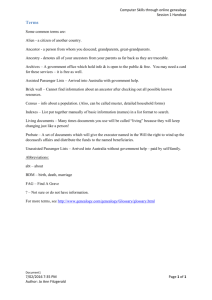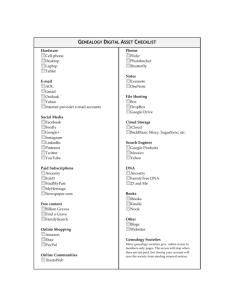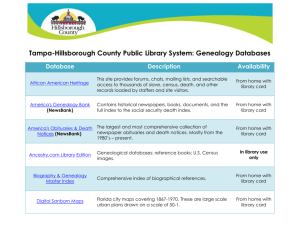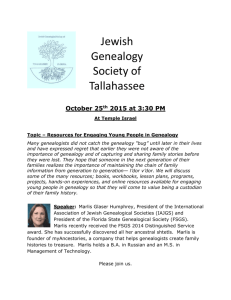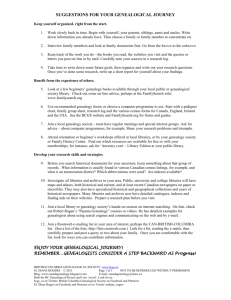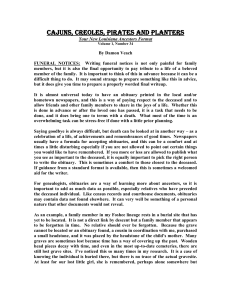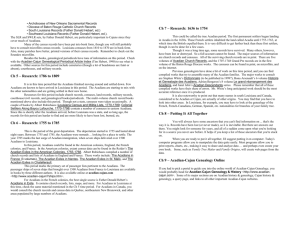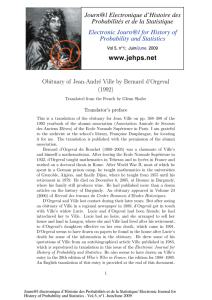CAJUNS, CREOLES, PIRATES AND PLANTERS
advertisement
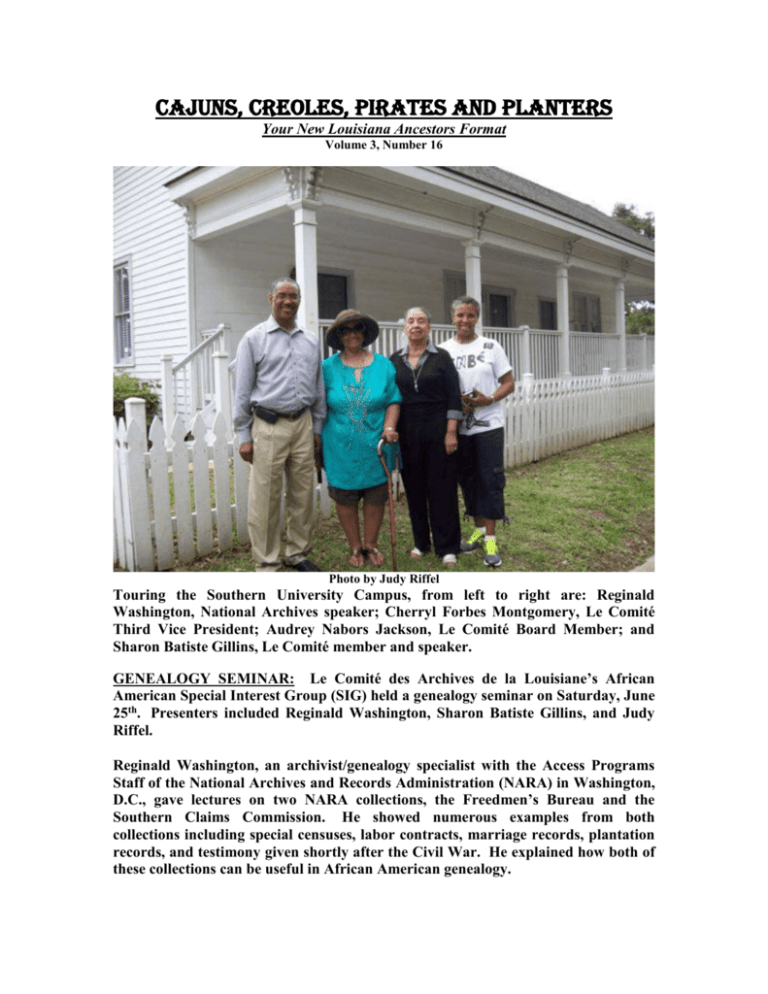
CAJUNS, CREOLES, PIRATES AND PLANTERS Your New Louisiana Ancestors Format Volume 3, Number 16 Photo by Judy Riffel Touring the Southern University Campus, from left to right are: Reginald Washington, National Archives speaker; Cherryl Forbes Montgomery, Le Comité Third Vice President; Audrey Nabors Jackson, Le Comité Board Member; and Sharon Batiste Gillins, Le Comité member and speaker. GENEALOGY SEMINAR: Le Comité des Archives de la Louisiane’s African American Special Interest Group (SIG) held a genealogy seminar on Saturday, June 25th. Presenters included Reginald Washington, Sharon Batiste Gillins, and Judy Riffel. Reginald Washington, an archivist/genealogy specialist with the Access Programs Staff of the National Archives and Records Administration (NARA) in Washington, D.C., gave lectures on two NARA collections, the Freedmen’s Bureau and the Southern Claims Commission. He showed numerous examples from both collections including special censuses, labor contracts, marriage records, plantation records, and testimony given shortly after the Civil War. He explained how both of these collections can be useful in African American genealogy. Sharon Batiste Gillins of Galveston, Texas, discussed Louisiana conveyance records. Using examples drawn from her own family research in St. Mary Parish, she explained how these records can be used to trace enslaved ancestors. She also described the process of doing research in the courthouse. Judy Riffel of Baton Rouge gave a presentation on African American genealogy websites. These included general research sites, online newspapers, slave narratives, court records, and plantation records. The all-day seminar was held at the Delta Sigma Theta Life Development Center on Southern University’s campus. Le Comité’s African American SIG is a growing segment of Le Comité’s large organization. Approximately 40 of its nearly 600 members belong to the SIG. They hold periodic meetings to discuss specific topics relating to African American genealogy. For more information, visit the society’s website at www.lecomite.org. Membership in Le Comité is $20 per year. There is no additional charge for joining the SIG. XXX MORE DE VILLE BOOKS: For many years, genealogical researchers have looked to Winston De Ville to come up with excellent research publications. All of his books are now available from Claitor’s Publishing Inc. and can be ordered directly from them. These are all reprints of the original publications, and the data in each is as important today as it was when they were first released. It is for this reason that I encourage libraries with major genealogical collections to add them to their research files. Many individuals will want them for their research files too. I have already reviewed a few of them, but there are many more to go, so I will do a few at a time. Otherwise, I would have numerous columns of only De Ville works to discuss. As prolific writers go, he is certainly of this category – writer, publisher, researcher – and with a long history of service to the genealogical community not only in the U.S. but worldwide. Acadian Families in 1686 is another of his earlier publications that should be of importance to anyone with Acadian ancestors. It is known that even before the American Revolution, the Acadian people had rebuked the English and were devoted to a spirit of independence. Of course, it is well known the price they paid for this. The year of this important census of 1686 came less than two decades after the Treaty of Breda was signed, and the Acadians were French again that year. However, four years later, the English attacked Port Royal, and it wasn’t until 1697 that the Treaty of Ryswick was signed which confirmed Acadia temporarily to the French King. Today, it is the same. They are French. With the migration to Louisiana, they remained French, yet still Acadians. Acadian Families in 1686 may be a small publication, but it is still a very important look at a group of people with courage to overcome and to survive. This book is based on Benjamin Sulte’s Histoire des Canadien Francais and is available from Claitor’s for $16.00. Another book that is important to those researchers with ties to Southwest Louisiana is De Ville’s Southwest Louisiana in 1807, The Land & Slave Tax of Saint Landry Parish in the Territory of Orleans. In this book, De Ville lists the proprietor’s name, location of the land, followed by the number of arpents, value of the land, and number of slaves owned. A sixth column allows what is apparently the amount of tax to be paid, but this data appears only for the first fifty-seven entries. In several places, miscellaneous notations occur. Editorial notations are bracketed. This is a rare reference tool for locating individuals in local neighborhoods, an asset in tracing land records. There are approximately 475 entries. This one is available from Claitor’s for $18.50. XXX INFORMATION NEEDED: Brenda Olavarrieta, 2033 Belmont Place, Metairie, LA 70001 (brendao@bellsouth.net) needs information on and old photographs of Ernest Alexandre and Henriette Vicknair, her maternal grandparents. Ernest was a son of Phillipe Alexandre, owner of Alexandre Bros. Store, no specific location given. Any information would be appreciated. Contact her for more details. XXX FREE SERVICE: Correspondence to this column should be directed to Damon Veach, Cajuns, Creoles, Pirates and Planters, 709 Bungalow Lane, Baton Rouge, LA 70802-5337. The e-mail address is ancestorslaveach@cox.net. Queries and book reviews are printed as space permits, and you are encouraged to take advantage of this free service. Claitor’s Publishing can serve as a distributor for self-published genealogy titles. Go to their homepage for details on how you can obtain this excellent service.
